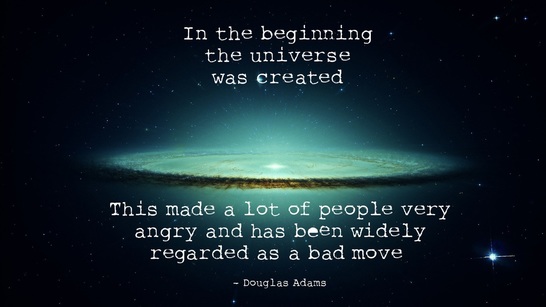|
My psychotherapist has a lot of words. Sometimes this is a source of frustration for me, especially if he uses a lot of them all at once in a fashion that means I have to work a little harder mentally or emotionally than I want to, or listen a little longer than my patience seems to allow for. Sometimes his words are hard to hear, sometimes I don't hear them at all.
At other times, his words cross the divide between us, find the words I'm not saying and say them for me. That can be close to a transcendent experience. The part of me which was too scared to express itself is not only seen, but spoken to. That which was nebulous and yet to be formed suddenly takes on new life, becoming real in a way it never could be when it remained unsaid. Recently I was struggling to put into words my feelings around a break. I was trying to say something, and failing, and then he said it for me...
1 Comment
I sat in front of my clinical supervisor for my fortnightly meeting in which I was supposed to talk about how I was coping, and how my work helping others was going. “I’m feeling really stressed at the moment.” I started off by saying. This was not an unusual way for me to start supervision sessions. I was hesitant to even bring this up, because I’d talked about my work stress often before and things didn’t seem to be any better for doing so. “How would you rate your stress from 1-10 at the moment?” She asked me in response. “I’d say an eight.” “Eight’s pretty high.” She said, then asked: “What are you doing for self care.” I rattled off a few things I was already doing, meditation, running, spending time in nature. All of the right answers, but I was already doing these things, and was still feeling stressed, and truth be told, pretty unhappy. I quietly despaired, pretended that I’d have a go at the further suggestions for self care that she made, and changed the topic to the work I didn’t want to do with drug and alcohol addicted citizens of West Auckland, who mainly didn’t want to get state mandated help from me, either.
Eventually, sick enough of the work and the workplace that skipped over the surface of the real social and personal issues, I left, a decision I never regretted for an instant. Looking back, I see this experience of so-called self care as actually being the managing of both clinicians and citizens - a substitute for real connection and healing, and certainly a substitute for addressing the disempowerment of both workers and the poor of West Auckland. Read the rest of the article by Michael Apathy here... I recently told my therapist that another therapist had told me I would make a good therapist. I'm not sure what reaction I really expected, but whatever it was, it wasn't the one I got. My therapist laughed. A lot. Like, a lot, a lot. I'm talking a really long time.
At that moment I didn't know whether the laughter was because he agreed I would make a good therapist, or if the idea was so ludicrous he could barely stay in his seat. I was leaning toward the latter reason. When we did eventually clarify his thoughts on the matter, it turned out that I was wrong. The same thought had occurred to him at some point and he figured I might make a good therapist too. And that surprised me. Mostly because I've told him all sorts of utterly unrepeatable things, many of which do not cast me in the best of lights. I've also, at times, had moments in therapy of which I'm less than totally proud. I have often not made his life easy. Not by a long shot. It's quite heartening when somebody who knows where the bodies are buried seems to think you can be trusted among the living. I'm not sure myself. On the positive side, I am very interested in therapy, and I do seem to have the kind of temperament and demeanor which encourages people to share things with me, almost in a pseudo-therapist kind of way. I've gotten used to the fact that near strangers will tell me dark secrets and then sort of wander off satisfied at being unburdened. I enjoy listening to people in that way, and I'm pretty practiced at sharing in the pain or the sadness or the guilt or the fear of others. I enjoy connecting with people and sharing those deeper moments with them. I've even accidentally therapisted a therapist before. During a session with a previous therapist, I quite nonchalantly, and without any thought at all looked at her during a lull in the conversation and asked her“what feels most useful to talk about?” She just stared at me, probably wondering if I was mocking her, and then we both cracked up laughing. I wasn't mocking her at all, I'd just kind of slipped into feeling as though I were the one who should be asking the questions, and that was the question she always asked, so it was the one that first came to mind while I was on auto-pilot. I have also played therapist with my cats and my dogs. I have asked how our relationship feels between us. I have inquired as to whether or not they are feeling anxious. I have suggested we explore their feelings on a deeper level through mindfulness. Most of the time they fall asleep during our sessions, but I'm okay with that... I have written about the gratitude journal before. If you missed that episode, here are the Cliff notes: angry client complains about everything under the sun for several sessions. Therapist suggests that journaling things client feels grateful for might make client feel better. Client vehemently rejects notion of not just journaling gratitude, but the concept of gratitude itself and proceeds to give a view of the world that would make even the most enthusiastic goth feel a bit overwhelmed.
The gratitude journal incident was many things, but primarily it was a point of deep contention because it rose out of what felt like a fundamental misunderstanding of who and what I was. Granted, it was an easy mistake to make. Going into a therapist's office and listing all the things wrong with the world from sick kittens to road cones might reasonably be interpreted as a fixation on the negative which could be addressed with some kind of shift in thinking. There can be no doubt that at that time I felt broken. But more than that, I felt that the whole world was shattered, to the very core of creation. One of Douglas Adams' books contains the following opening lines: “The story so far: In the beginning the Universe was created. This has made a lot of people very angry and been widely regarded as a bad move.” Douglas Adams wrote that as a joke, but sitting in the therapy office his words rang true for me. It was all bad, it was all broken, it was all wrong. Hand me my towel, I'm ready for the hyperspace bypass to come on through. (This is a snippet of a piece written by an anonymous client of Lucid Psychotherapy & Counselling. This piece is a part of a new series of writings on counselling/psychotherapy; a client's perspective.)  When people have a child, they are generally congratulated on the birth of their new baby. 'Congratulations on the birth of your son!' or 'So wonderful to hear you have a new daughter!' This is because babies are considered an achievement, a blessing and a generally all round good thing most of the time. But what of the baby? A baby is not often congratulated on its parents, perhaps because it would seem absurd on the face of it. Because as much as being born is generally considered to be a great thing (we call it the gift of life), the simple fact is that a great many people, myself included, are born to parents who have deep scars on their psyche and troubles with addiction that the baby slowly comes to realize as it matures – and not only to recognize as a problem, but be intrinsically shaped by. What congratulations are in order for that child, who, born entirely innocent finds itself in the care of a person who cannot properly care for themselves? What sympathy do we have for the sorrows which are heaped upon a yet unformed mind, heart and psyche? A baby is not congratulated on its parents because a baby has no choice in them. It is the passive passenger of genetic chance. Instead of congratulations, all anyone can really offer an infant is a well meaning 'good luck'.... (This is a snippet of a piece written by an anonymous client of Lucid Psychotherapy & Counselling. These pieces will be part of a new series of writings on counselling/psychotherapy; a client's perspective.)  This post isn't about some new idea in psychotherapy or counselling, or about the psychology of the social or environmental issues we collectively face. It's about the afternoon that I spent yesterday taking some of my own medicine - a dose of ecotherapy. The first thing I want to say is that it's so strange, that it takes getting a bit sick and run down and feeling like I have to stop running in the rat race, to actually give myself something different. Weaving through traffic and the unexpected traffic jams, I felt like I was making a prison break. I half expected that some last work commitment or emergency would stop me from getting to the start of the trail I was headed to at the base of the port hills. In hindsight I was actually worried that I'd flake out without a good excuse, and then have to face having sabotaged my own aspiration without even having an external barrier as a justification. As I began to walk up the gentle (and then steep) uphill start of the trail, this slightly urgent anxiety to escape began to relax as I felt committed to the trail and direction I had selected. Soon this commitment began to shift to excitement and desire to see the view from the next crest of the hillside. I could feel my empty physical and emotional gas tank begin to refill. Pausing often, to turn around look behind, I began to get perspective on the city. No longer a trapping and limiting, stress and anxiety provoking maze through which I madly run, Christchurch had become a sweeping vista. As I continued to climb, being an ecotherapist, I kept tuning in to the mental and emotional shifts that were happening inside of me. I noticed that as I began to sweat and glow from the climb, I began to feel more robust and confident, feeling my own capacity to work and progress and rise up over my previous foul mood. By the time I had reached the top I had also reached within myself a strong feeling of gratitude. This gratitude was towards myself, for having given myself this experience and worked for it, but also for having the amazing geography of the port hills so close by. The thought occurred to me: "I am made for this." And I think that's true. I, and you, were made to move through landscapes and to work physically, roam, to find new paths, and to trust the instincts of the body rather than a schedule or a fluorescent office environment. I don't happen to believe that a personal deity came along and made this world to suit my needs, but it's a pretty good moment when I spontaneously find myself feeling that evolution made me to enjoy walking, looking out at views, and feeling the wind on my face. The descent felt less ecstatic, but still important. I'm not going to live the rest of my life (or even much of it) out on a hillside, as much as I can love it for a while. The impulse to escape the city had shifted to a readiness to return, a sense of warmth and tolerance towards the people and activities that I had needed a break from. Descending is not about ecstasy, it is about careful details of placing a foot in such a way that we do not slip or turn an ankle. As much as the details of my life persecute me at times, it was good to feel ready for rather than resistant to the painstaking detailed work of descending. I'm glad to be able to share this experience with you through this blog post, but I'd like to take this further. A hell of a lot of research and my own experience tell me that those of us who struggle with issues such as anxiety or depression will find this sort of experience at least as beneficial as sitting in a therapy room with me. I look forward to starting up ecotherapy experiences this spring, so stay tuned for that! When Psychotherapists and Counsellors start their training, usually the first thing that they're taught to do is to listen to what their clients say, and then to give succinct summaries back to the client, so that the client can hear what they've just said, and that they've been heard. In worst case scenarios, this leads to experiences of sitting down with a therapist, pouring out one's heart to them, and hearing back in a some-what parrot-like way, the gist of a the problem for which one so desperately is seeking a solution. Of course, it's important that your Counsellor or Psychotherapist actually does listen to you, and certainly that is better than simply having one's feelings shut down, or covered over by advice. That said, I do think that in a way, therapists still do listen too much.
The reason why I say this, is that we all use the defences that I've written about in previous posts, practically all the time. Furthermore, it is usually the use of some of these defences, that are actually creating the problem in the first place. Frequently, even at the start of a first session, a client's defenses will stop them clearly describing to me what the problem is that they'd like me to help them with. For instance, when I ask during an initial session what the problem is that my client would like me to help them with, they may reply with the defence of projection (of their will) by telling me (indignantly) that their psychiatrist thinks they have a problem! Or they may reply whilst using the defence of withdrawal, telling me about the problem in such a small tone of voice, and without making eye contact, that it's as if they're miles away from me. If we can't clearly agree on what the problem is that we're trying to address through therapy, it's unlikely that we're going to be able to work together effectively on dealing with that problem. According to intensive short term dynamic psychotherapy (ISTDP), it is our defences that creating our problems, and therefore are hurting us. It's my job to (with the client's permission) to interrupt their automatic and unconscious use of defences. For instance, withdrawal and isolating is often part of what perpetuates depression. By helping a person to see in a session how they withdraw from me by not looking at me, mumbling, or talking in a small tone of voice, I can help them to begin to experiment right there and then with making some of the changes that will help alleviate the depression that they wanted my help with. This brings me in a roundabout way to the title of the post. Psychotherapists and counsellors need to do more than just listen. Sometimes actually helping a client is to interrupt them, and help them to begin to express the emotion that they need to deal with, rather than spin around helplessly getting nowhere because they're using a defence without even realising it. I'm not suggesting a tactless of callous form of therapy. To skillfully interrupt a client's defence in the right way at the right time is an act of caring, and healing. The people who come to me for therapy usually don't know the technical information about defences and different styles of therapy, but they can feel the sense of relief when their use of defences has been interrupted and they can actually feel themselves again, and begin to choose a more healthy way of relating. Somatising is a controversial defence mechanism for a number of reasons. Overall, somatising is not understood well by many professionals, including psychotherapists, counsellors, and psychologists. Somatising is often confused with hypochondria (a preoccupation with or fear of signs of illness), which though a real mental health issue in it's own right can be misunderstood as a manipulative or silly bid for attention.
In essence, through somatising we fend off a disturbing reality or painful feeling and instead experience it as a physical illness. When the unconscious underlying pain is fully felt and acknowledged, the symptoms of the somatising - the psychosomatic illness, reduce or disappear. Over time society has become more sophisticated in it's understanding of how mind and body interrelate. It is a mainstream and accepted idea that stress and anxiety can contribute to physical illnesses. Somatising, however, is more complex than this. At Lucid Psychotherapy and Counselling we are influenced by a form of therapy called ISTDP - intensive short term dynamic psychotherapy. According to ISTDP, anxiety or stress per se, does not make us sick. What is crucial is the way, or pathway, through which we experience anxiety. Though nothing in this blog can or should substitute for medical advice, if your experience of physical illness seems to be connected with your degree or anxiety or the anxiety provoking situations in your life, you may be somatising. It was with great sadness that I heard today of the closure of Relationships Aotearoa, something only decided upon this week as talks between the Government and Relationships Aotearoa broke down. RA is New Zealand's largest psychotherapy and counselling provider, with 60 locations, 183 employees, and 7000 clients. Furthermore, they have been known as specialists in relationships and couple's counselling, having trained many other practitioners in Emotionally Focused Therapy for couples.
Minister of Social Development Anne Tolley has explained the government's position by focusing on dysfunction within RA, and has said that it is not the taxpayer's responsibility to take up the slack for poor financial management by RA. Unfortunately this is a scenario that I have witnessed repeatedly under National Governments. Rhetoric about efficiency and hostility towards the public sector from the National Government has put immense pressure on social service and health organisations. I am convinced that the effect of funding and contract uncertainties, and closures, is anything but efficiency. It has become normal within counselling and psychotherapy agencies to function under the considerable stress of funding uncertainty, and for the individual employees, loss of livelihood. The National Government would like us to think that this is the market delivering us taxpayers efficiency, through healthy competition. What I have seen and heard about in many counselling and psychotherapy agencies is clinicians becoming debilitated by dealing with this additional pressure on top of dealing with the stress and pain that their client's bring them to work with. Research on burnout in mental health professionals includes various studies, a UK study showing that 21% to 41% of professionals at any one time report high levels of emotional exhaustion. When these staff burnout, they become more physically and mentally sick, less effective, and become more rejecting and judgmental of those that they are supposed to be able to help. I have seen agencies waste countless hours of their staff's time managing the stress of financial pressures, rather than be able to do what they do best - help their clients. Clients get switched between clinicians due to closures or difficulty with staff retention, often negatively impacting their emotional healing. In summary, clinicians are hurt and are less effective due to constant funding uncertainty delivered by the National Government. By Anne Tolley's own admission, these sorts of "efficiencies" are likely to continue. Whilst the RA closure is nation-wide, Christchurch is particularly in need of steady and effective support whilst in post-earthquake recovery. Tolley mentions the shift of funding to families and young children. While this is supported by our increased understanding of developmental neurobiology, what we have also learned from this field is that babies and young people do not develop in isolation. I am sure that the clinicians at Relationships Aotearoa have helped thousands of young New Zealanders by ensuring that they never have to be impacted by their parents abusing each other or physically fighting. Mental Health professionals play an absolutely vital role in New Zealand society. We rightly expect high standards of them, when the lives or the happiness of those we love are at stake. Do we give them the support they need in order to fulfill our expectations? This post we'll look at the defence mechanisms of idealisation and devaluation, and how these manifest in psychotherapy and counselling.
In this defence, either self or other (or both) are seen unrealistically. In the case of idealisation, a person's good characteristics are exaggerated, and in the case of devaluation a person's worst characteristics are exaggerated. Like many other defence mechanisms, this is understood in popular culture. For instance, most of us could think of people we know who put others up on a pedestal, then complain bitterly to their friends when that person disappoints and becomes devalued as the lowest of the low. Celebrity gossip mags also illustrate this process, idealising celebrities to god-like status, then tearing them down in quick succession by critiquing their bodies, relationships, personalities, or fashion sense. As with other defence mechanisms, uncomfortable feels are being warded off through this process. You'll have to bear with me as I get a little bit into psychoanalytic technical distinctions, to explain what those feelings typically are. The first group of people who particularly use the defence of idealisation and devaluation are those with narcissistic personality styles. The fundamental issue for narcissistic personalities is a difficulty with self love, or self esteem (though it should be emphasised that one does not need to be narcissistic in order to struggle with self esteem!) A more grandiose narcissist will idealise themselves and devalue others, to avoid their painful lack of love for themselves. An opposite, more depleted sort of narcissist will devalue themselves and idealise others. (This may seem more counter-intuitive as s strategy for avoiding self hatred, but by maintaining some form of connection to the idealised other, a depleted narcissist manages to scavenge some scrap of love for themselves via association.) The use of this defence tends to take a heavy toll on relationships. The second type of personality that is known for using the defence of idealisation and devaluation is the histrionic personality style. This is a character style less well known then narcissism. Histrionic personalities tend to be warm, dramatic, strongly emotional, and sensitive in general, and particularly sensitive in regard to abandonment. Here the idealisation and devaluation functions not so much to ward off painful self hatred (as with narcissistic), but to fend off the fear of abandonment by establishing an omnipotent idealised rescuer, who may even be able to rescue the histrionic if they become helpless when emotionally overwhelmed. A word of caution, if you're reading this and think that you recognise yourself in either of these personality styles, please don't jump to any conclusions and diagnose yourself! Most of us exhibit some of the above dynamics some of the time. Psychotherapists and counsellors tend to hold the above distinctions lightly, with a grain of salt, so please feel encouraged to do the same, and don't use any of this as an opportunity to beat yourself up! A counsellor or psychotherapist may draw their clients attention to moments in which they use the defence of idealisation or devaluation. In my experience, it is rarer for therapists to draw attention to this defence, then some of the other defences that I've blogged about. I'm not sure why this is the case, but if you've got some thoughts about it, please let me know in the comments section. |
AuthorsMichael Apathy and Selina Clare are practitioners of psychotherapy at Lucid who are excited about fresh, innovative, and effective therapy for individual and environmental change. Categories
All
Archives
December 2016
|
Specialty Areas |
Online BookingBook my first session.
If there are no bookable services showing via the online booking website, this means we currently have a waiting list for new clients. Please give us a call or email if you would like to add your name to it. |



 RSS Feed
RSS Feed